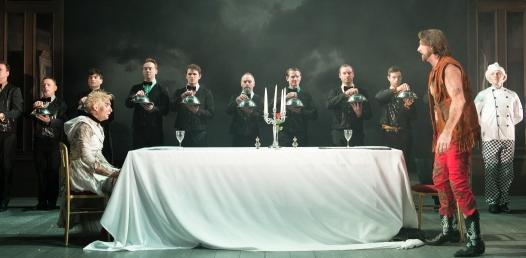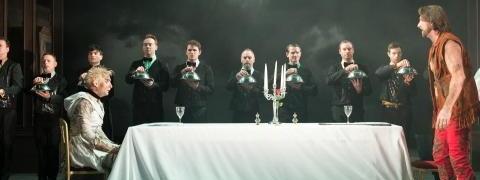[dropcap style=”font-size:100px; color:#992211;”]I[/dropcap]t is a cliché, but true nonetheless, that The Taming of The Shrew presents a challenge to modern directors, perhaps more so than any of Shakespeare ‘s other plays.
The fiery, independent “shrew”, Katherine, is forced by her new husband through a series of mental and physical deprivations in order to become like “(his) horse… ox… ass”, and entirely subservient to his will; so much so that by the final act she herself will lecture other female characters to obey their husbands as “thy lord, thy king, thy governor”.
This is obviously a tricky Elizabethan square to fit into a 21st century circle, and some way must be found to make the dramatic action palatable.
Some interpretations opt for the ironic route, with Katherine a semi-willing participant in the rules of the game. In these productions, full vent is given to the erotic charge in the central relationship, illuminating Katherine as one of Shakespeare’ s most charismatic heroines, who never fully loses her dominance and sexual power, and who, albeit ambivalently, feels some degree of love for Petruchio.
[quote]His fantasy ends
with him glorying
in the domination
of Katherine[/quote]
Director Edward Hall finds another solution. In this production, the Christopher Fry subplot which frames the main action, and which many productions cut, now takes on a deeper significance, and the Katherine- Petruchio play-within-a-play is now revealed to have been nothing more than Fry’s drunken dream. His fantasy ends with him glorying in the domination of Katherine, and the other characters are revealed as actors, who leave the stage in disgust as this snarling bully stands with his foot poised threateningly over a bridal veil.
We are reminded of how, in a world of misogynistic internet porn and domestic violence, for many women the brutal subjugation continues, and Fry reveals himself as an all-too-familiar twenty-first century figure.
It makes for a chilling ending, and Vince Leigh carries it off with a terrifying depth of hatred.
This interpretation, however, is not entirely without its difficulties.
In order to make the “it was all a dream” ending intellectually congruent with the rest of the play, the preceding two hours needs to be played in a way that distances the audience from seeing the action as entirely real in any way. The text is therefore performed as theatrically as possible, the all-male casting adding to the distancing effect, and the humour is broadly played.
Visual gags are played to the hilt, and no stick is left unslapped in order to maintain a zany, high energy atmosphere: bare buttocks, slapstick, added swearwords, “up yours” finger gestures, and memorable scene-stealing turns from Arthur Wilson (Bianca), John Douggal (Gremio), and Ben Allen (Biondello).
It is true that the acting style can tend towards caricature, and some of the intimate soliloquies seem slightly awkward in this context, but the pleasure the audience derives from the proceedings, and the commitment of the cast far outweigh any quibbles one might have about the loss of some of Shakespeare ‘s nuances.
More problematic, perhaps, is the brutal portrayal of the central relationship of the play. The mutual attraction and depth of feeling which I believe Shakespeare intended Petruchio and Katherine to feel for each other may be disturbing and unacceptable to modern eyes, but without it, there is the slight sense of something amiss.
Nonetheless, with excellent music, a magic box set of endless visual surprises, and Propeller’s overall wit and gusto, it is still an evening that delights and shocks in equal measure.
The Taming of The Shrew by William Shakespeare,
Venue: Teatro de Canal, Madrid
Company: Propeller.
Director: Edward Hall
Date: Thursday 6th June 2013
[button link=”http://propeller.org.uk/home” newwindow=”yes”] Propeller[/button]
A review of Shakespeare ‘s Taming of the Shrew. A play by William Shakespeare.




















